Judo champ throws Kosovo hopes into Rio Olympics mix
- Published
'I want to show the world we can be equal'
Flying the flag can be a vexed question in Kosovo.
The black eagle of Albania is on display all over the capital, Pristina. On the other hand, in Mitrovica, the Serbian shield flutters defiantly at the north end of the notorious New Bridge, which splits this ethnically-divided town.
But eight years on from the unilateral declaration of independence from Serbia, the official flag of the Republic of Kosovo remains - at best - a distant second-favourite for much of the population.
The unlovely design does not inspire devotion. It looks like the diplomatic fudge it almost certainly was - an inoffensive shade of blue (Albanian red was out of the question), with a graphic representation of the country's borders (a warning against any future changes) and six stars (symbolising Kosovo's major ethnic groups).
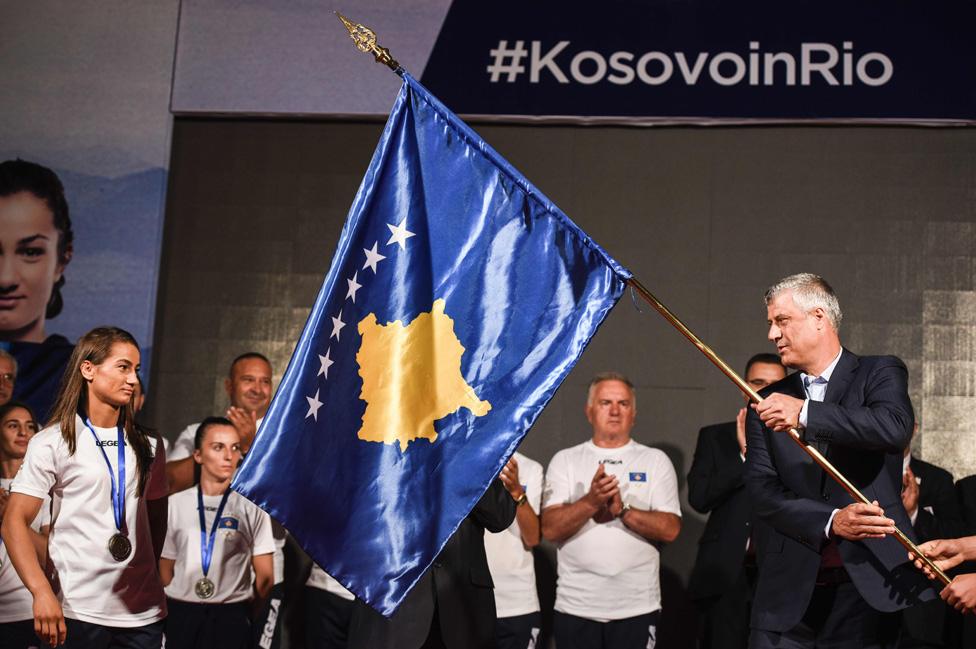
Kosovo is sending eight athletes to its first Olympics
Judo favourite
But in Rio, this flag will fly at the Olympic Games for the first time. And it will be carried by an athlete who is a strong favourite for a gold medal in her event.
Majlinda Kelmendi is a double world champion judo player - rated as the best in any weight category in 2014 - and has just reclaimed her European title, after injuries prevented her from competing for much of 2015.
"It was a hard year, but I came back good," she says after a training session at the spartan Ippon dojo in the hills above her home town, Pec (known as Peja among the ethnic-Albanian residents).
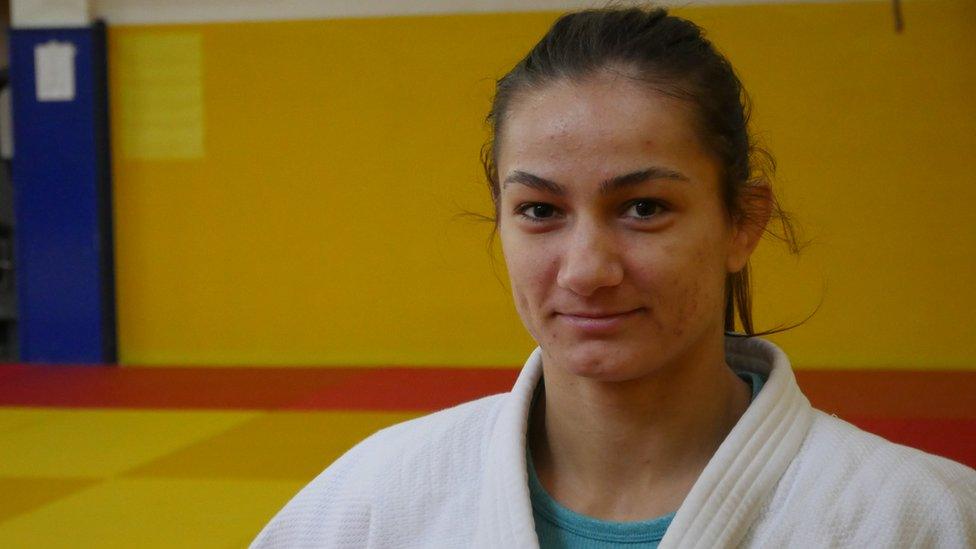
Kelmendi insists her focus is on sport, not politics
This will not be Majlinda's first time at the Olympics. In London, she represented Albania but did not make it through to the medal rounds - leaving her with mixed feelings about carrying Kosovo's flag in Brazil.
"I just want to represent Kosovo as a new country and promote it. But I don't want to talk about this - I want to focus on my fight.
"In London I was good enough - prepared and strong. But I thought too much about what people would say if I won or lost. Afterwards we can talk about how it felt to be the flag-bearer!"
'Model ambassador'
Regardless of Majlinda's determination to keep a lid on her feelings, this is a big moment for Kosovo. Its independence remains unrecognised by more than 80 UN member states, including China, India, Russia and, indeed, the host nation of this year's Olympics.
Participation in Rio is only possible because the International Olympic Committee accepted Kosovo as a member at the end of 2014. That encouraged other sports governing bodies to follow suit - most recently Fifa and Uefa.
But Kosovo's political leaders are keen to acknowledge the role played by the world champion from Pec.
"Majlinda is a better ambassador than me and all the other diplomats combined," says Deputy Foreign Minister Petrit Selimi.
"There are great sportsmen and women in Kosovo - isolating them is unfair and dangerous. Open hearts and minds aren't born in isolated states. We will use the results on the sports field to ensure that if we can have our flag in the Olympics we can have it in other things."
Sport plays a key role in Kosovo's campaign to gain greater recognition of its independence. "We will use membership of Fifa and Uefa to expand our portfolio of lobbying arguments," says Mr Selimi.
Kosovo win first full international
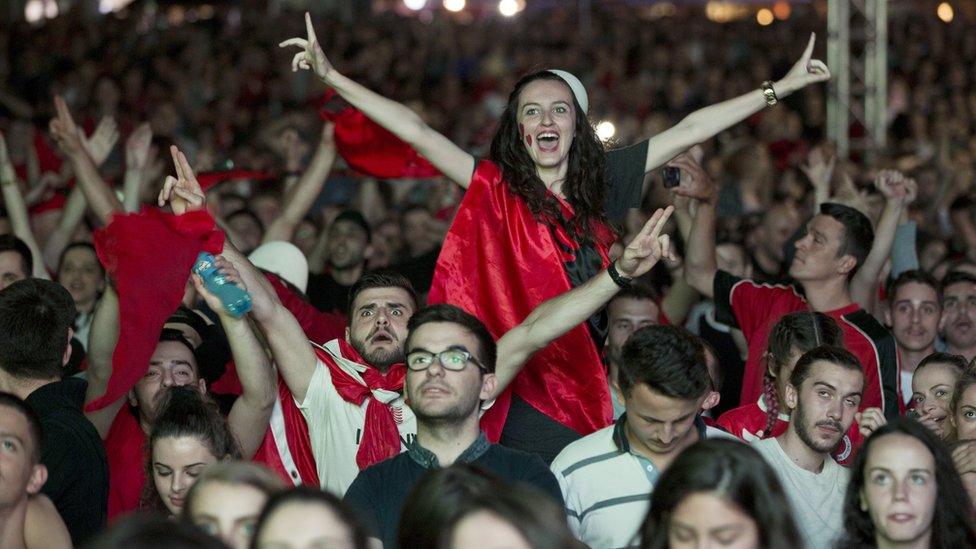
Kosovo Albanians cheered for Albania in the Euro 2016 football tournament
Promotion through sport
Long-term observers of the Western Balkans see recent developments as crucial to maintaining momentum.
"Recognitions have slowed significantly in recent years," says James Ker-Lindsay, senior research fellow on the politics of Southeast Europe at the London School of Economics.
"In the absence of recognition at state level, one of the key ways to legitimise Kosovo is integrating it into international sporting organisations and events.
"A few years ago a diplomat said Belgrade will finally accept Kosovo as an independent state when it sees Kosovo playing football in the World Cup - and I think that's an accurate statement. By taking part in the World Cup and the Olympics, Kosovo is really cementing its place on the international stage."
This legitimisation applies as much to its own people as an external audience. The lack of a team to cheer at international events has led many ethnic-Albanians to shout for Albania instead.
And the absence of many of the other symbols of statehood - from an international dialling code to membership of the United Nations - has added to a sense that Kosovo is far from a fully-formed country.
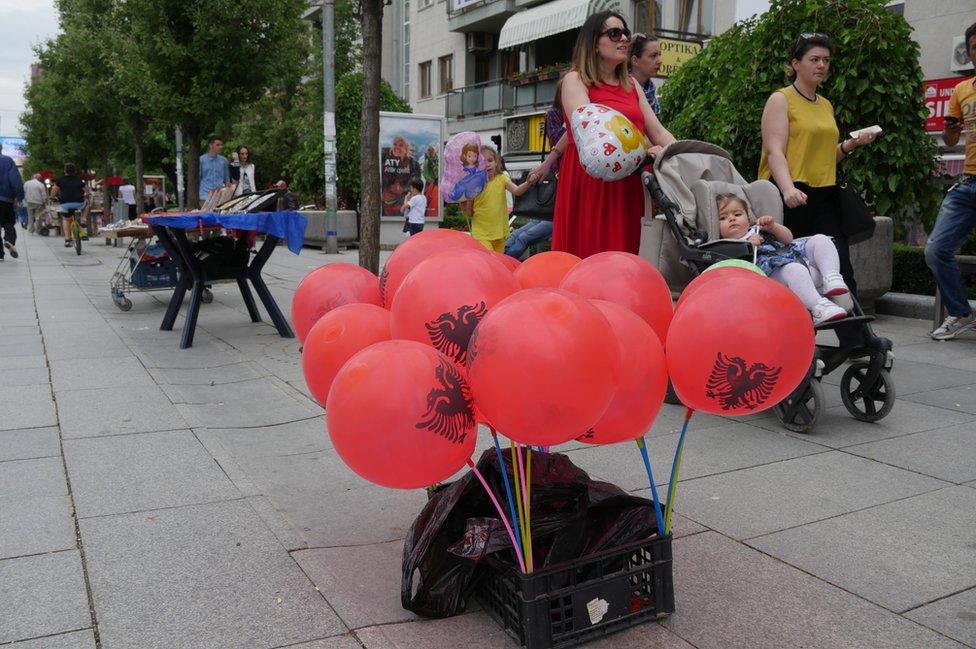
The Albanian flag takes the form of balloons in Kosovo's capital Pristina
'Healthy' patriotism
Besa Luci, editor-in-chief of Kosovo 2.0 magazine, was behind Kosovo Wants To Play - a campaign for sporting recognition. She says the opportunity to represent Kosovo is crucial to the country's health.
"Otherwise you're just paving the way for Albanian nationalist sentiment to grow.
"People want to feel for Kosovo and see it represented internationally. What we saw with the first friendly football match against Haiti was people with Kosovo flags and T-shirts - people for the first time embracing and accepting the state symbols of Kosovo.
"The moment you have the opportunity to represent your country internationally, you will also start demanding more from your state. Ultimately it enables people to be citizens of a country, state, republic, where everyone should be treated equally. Sport has that kind of power."
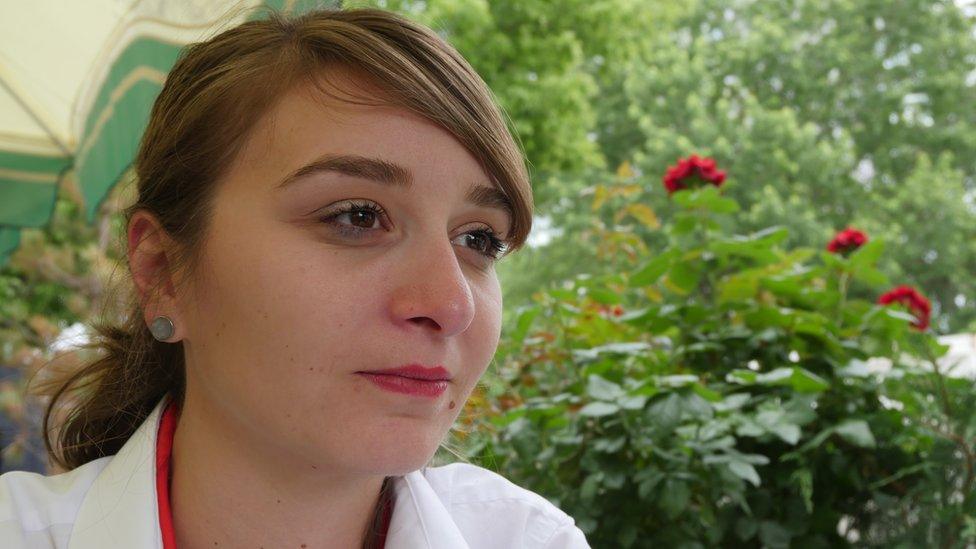
Besa Luci says international sport helps to improve citizens' rights
In Rio, it will be Majlinda Kelmendi representing Kosovo - and she certainly has the power to bring joy to her compatriots.
"If athletes from Kosovo are successful at the Olympics, it will help the country a lot," she says.
But then she narrows her focus - in the way that champions do.
"Whether I win or lose is my responsibility. I only have to be responsible to my coach - I don't need to think about what the prime minister or the president will say."